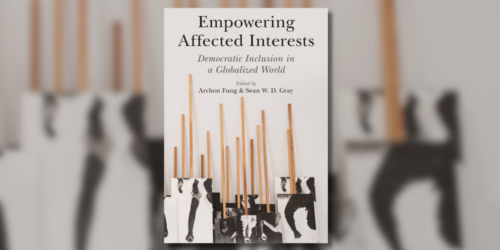
Podcast
Inside Trump’s White House
White House reporter Annie Linskey offers a closer look at how the Trump White House makes decisions and what recent actions reveal about its strategy.
Book
In this book, Empowering Affected Interests, Archon Fung and Sean W. D. Gray explore the radical implications of the All-Affected Principle in a globalized world, bringing together leading theorists to examine how democracy might be reimagined to address cross-border interdependence on issues like immigration, climate change, and labor markets.
Many demands for democratic inclusion rest on a simple yet powerful idea. It’s a principle of affected interests. The principle states that all those affected by a collective decision should have a say in making that decision. Yet, in today’s highly globalized world, the implications of this ‘All-Affected Principle’ are potentially radical and far-reaching. Empowering Affected Interests brings together a distinguished group of leading democratic theorists and philosophers to debate whether and how to rewrite the rules of democracy to account for the increasing interdependence of states, markets, and peoples. It examines the grounds that justify democratic inclusion across borders of states, localities, and the private sector, on topics ranging from immigration and climate change to labor markets and philanthropy. The result is an original and important reassessment of the All-Affected Principle and its alternatives that advances our understanding of the theory and practice of democracy. This title is also available as Open Access on Cambridge Core.
In celebration of over 20 years as Harvard’s hub for democracy research, the Ash Center launched its Open Access Scholarship Initiative to enhance the accessibility and the democratization of key works by making them downloadable for free.
Podcast
White House reporter Annie Linskey offers a closer look at how the Trump White House makes decisions and what recent actions reveal about its strategy.
Podcast
Jonathan Rauch joins the podcast to discuss why he now believes “fascism” accurately describes Trump’s governing style.
Podcast
Drawing on new data from more than 10,000 Trump voters, this episode of Terms of Engagement unpacks the diverse constituencies behind the MAGA label.
Feature
Economists and policy analysts broadly agree that more housing needs to be built in order to reduce costs in America’s most expensive cities. Using a novel survey of mayors of mid-sized and large cities to explore mayors’ views on the roots of America’s housing crisis and what solutions they believe will most effectively address their constituents’ housing challenges, the authors summarize mayors’ attitudes and perceptions on key issues related to expanding the housing supply, reporting how well these views correlate with mayors’ assessments of their own cities’ supply needs.
Podcast
White House reporter Annie Linskey offers a closer look at how the Trump White House makes decisions and what recent actions reveal about its strategy.
Additional Resource
In a new essay, The Case for Building an AmeriCorps Alumni Leadership Network, Allen Lab Policy Fellow Sonali Nijhawan argues that the 1.4 million Americans who have completed national service represent an underleveraged civic asset. Drawing on her experience as former Director of AmeriCorps, Nijhawan outlines a roadmap for transforming dispersed alumni into a connected leadership network capable of reinvigorating public service, rebuilding trust in government, and strengthening civic participation.


